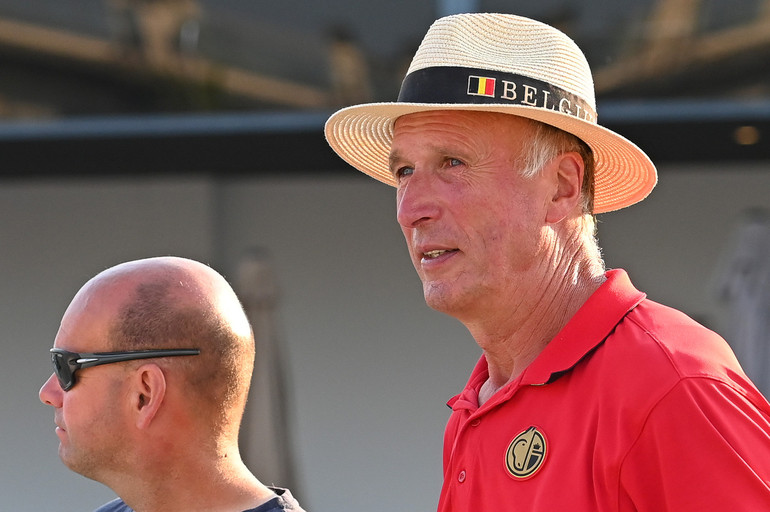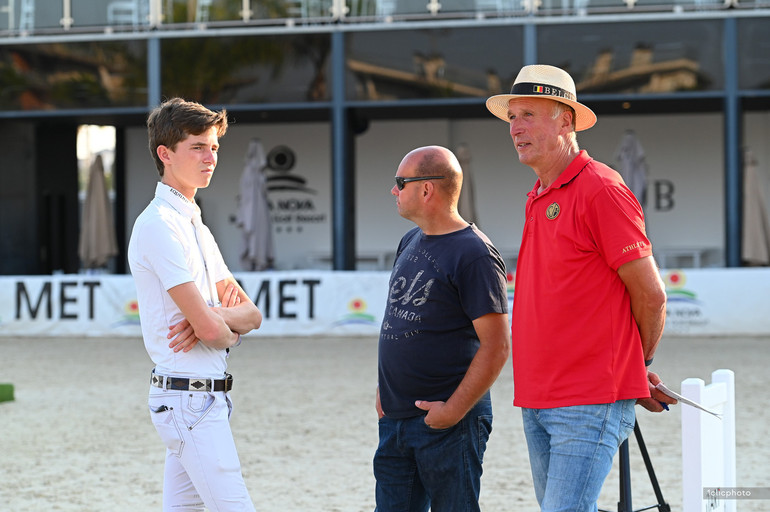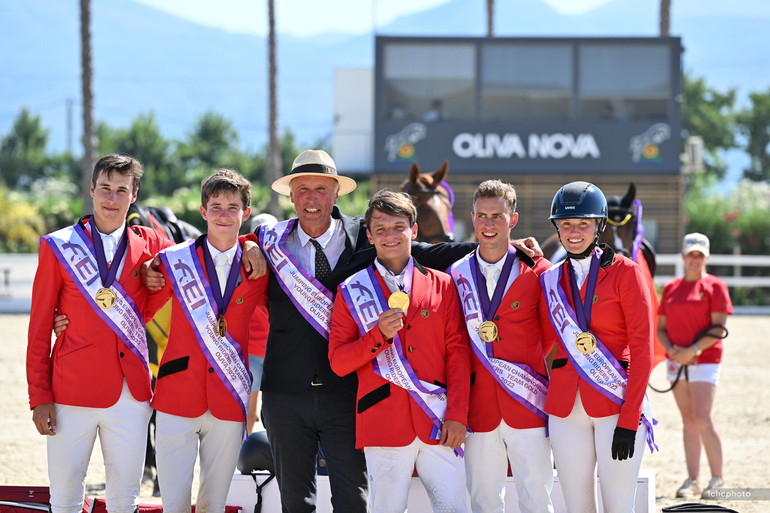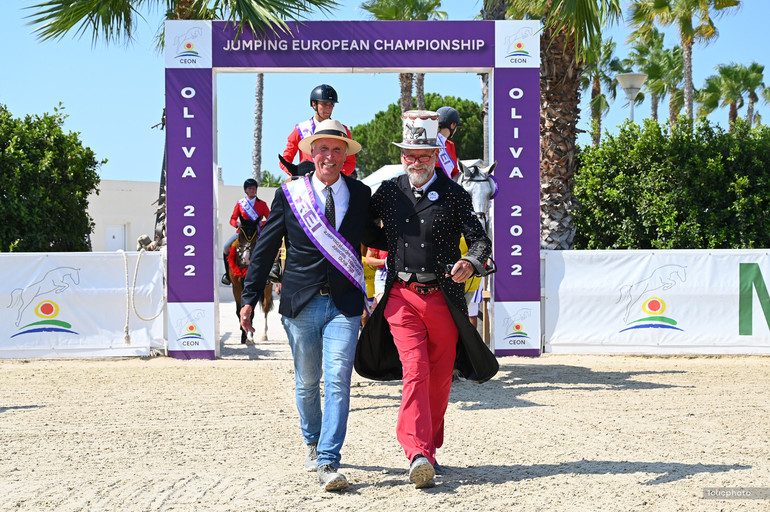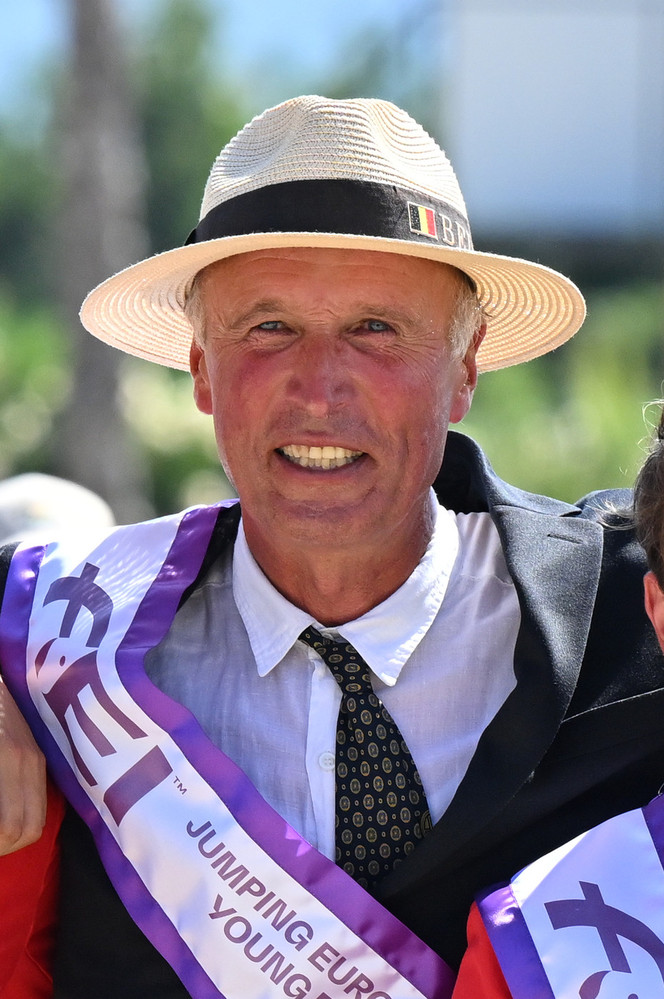Text © World of Showjumping
At the FEI Jumping European Championship for Young Riders, Juniors and Children 2022 in Oliva Nova, Spain, it was the Belgian riders that dominated. Taking two team golds – for young riders and juniors – as well as individual young rider gold, junior silver and bronze, and children’s bronze, the Belgians continued on their wave of success from last year’s championship in Vilamoura, Portugal, where they won team gold in each age category.
When World of Showjumping met Rik Deraedt, the Belgian Chef d’Equipe for the youth riders, at the beginning of the week in Oliva Nova, the Belgian 61-year-old was cautiously optimistic, speaking of the unpredictability of the sport and how finishing on the podium this time around would be more than enough. Fast forward one week, and Deraedt was affectionately referred to as the “Golden Coach” by his team members and fellow Chef d’Equipes.
“I am happy to be the coach of such good teams,” Deraedt told WoSJ. “Without these horses and riders, I could not be a part of winning as many medals as we have done over the past years. I am happy to have chosen the right horse-and-rider combinations – I think the results confirm this. However, for me, the most important aspect is to see my riders come out of the ring with a smile. I want to see them kissing their horse, I want to see everyone happy; all the grooms, riders, trainers and parents. Everyone knows how difficult this sport can be, so the joyful moments are everything – it’s why I do this job.”
All about a good start
For the past 32 years, Deraedt has been running a riding school in the westernmost province of Belgium, near the coast to the North Sea. “We start with little kids and bring them up to a higher level, to compete at the national junior and children’s championships,” Deraedt tells. “We have about 60-100 horses and I teach every day. I give lessons to the little ones and also to the ones who are jumping higher. I think it is very important for children to get a good start to their riding careers right from the beginning; it is easier for them to build on a foundation that is solid. I believe that riding with good trainers in the first years is essential. However, many top riders in Belgium come from families with horses; they have the basic knowledge right from the start. In Belgium, most riders who are on the top now, started with good teachers – it is so important.”
Deraedt started working as a coach and Chef d’Equipe 30 years ago, after an accident ended his own riding career. “I am also a farrier, and I was shoeing a horse that fell on my feet,” he tells. “I was 25 years old when it happened, and although I went through surgery no less than twelve times, my career in jumping was finished. Therefore, I started to give lessons and followed many trainers. The Belgian Federation was very supportive; they said there was no one in my area to give lessons to the jumping riders and I was asked to share my experience. In 2011, I was asked to be Chef d’Equipe for the young riders, and I thought, ‘why not’. My first show as a Chef d’Equipe was in Comporta that year with the Philippaerts-family; Ludo told me he would show me how to do it. It was my first time, and we won both individual and team gold, with Ludo’s boys Olivier and Nicola. Jos Kumps was there with his two sons too… it was incredible. We got the taste of winning, and I thought it was lovely – and wanted to do it again. Since then, we have won a lot of medals for Belgium.”
The Belgian team spirit
“I think it goes so well because we all push in the same direction,” Deraedt explains about the Belgian success. “In this world, there can be a lot of jealousy – it is human – but in a team setting, you have to put it away. When we are at a championship, we are there as a group, as a team. It cannot be just a show we put up, it has to be genuine; we have to really work together. Everyone has to keep pushing each other: If one is tired, the others support, we are always together.”
“I know the riders really well, I have seen them a lot and I am with them most of the time,” Deraedt tells. “It is also easy now with Clipmyhorse.tv, to keep an eye on everything. I try to help my riders in planning, and with any questions they might have. The riders already have a lot of experience; in Belgium, the young riders can go with the seniors to the two- and three-star shows and Nations Cups. In June, Thibault [Philippaerts] and Thibeau [Spits] were in Madrid for the Nations Cup with Fabienne [Daigneux] – who also was in Oliva to help us. In Belgium, if you are good enough, you get the opportunity to go. For young riders, it is good to have more experience, and not only do the young rider Nations Cups. With the seniors they learn a lot. Here in Oliva, we had Constant [Van Paesschen] and Jerome [Guery] present – we are a very good team, all the trainers help each other, there is no jealousy.”
“Our vets also play a big part in the success,” Deraedt continues. “They are always there to help and look at the horses first thing in the morning with me. We talk with the riders about their feeling and discuss ways to help the horses where we can. Our team-vet communicates with the vets and trainers of each rider to make a plan on how to best manage the horses. Some horses are more challenging to manage than others and it is important to work together in this aspect too. In Oliva, it was very hot, but all my riders knew beforehand how to manage it, with electrolytes and vitamins so they came prepared.”
The horse comes first
“The horse is the most important,” Deraedt replies when asked what he teaches his students first. “Without the horse, there is nothing. At our place, the kids know that before riding, they have to give time to their horses. They have to go out to the ponies first thing in the morning, take them out to the fields and feed them. After that, they have breakfast themselves. When you are a rider, the horse is the most important and that is what we want to teach them: The horse first, before themselves, always. If kids learn this mindset when they are young, they have the opportunity to understand that when they manage their horses well, maybe they can become a champion – without good management, it is not possible.”
Without the horse, there is nothing
“A horse is not a car; you cannot leave them alone for a week, they need attention every single day. If you don’t get this, you cannot become a champion – not in Belgium, not in Europe, not anywhere in the world. You have to work every day. It is important that kids learn this when they are young. Now, many parents have a lot of staff for their kids, but I think if you look at those who are successful, they work from morning to night, they have all learned it from a young age. Furthermore; if you have a bond with your horse, your horse will do it for you and with you. You can always ride a horse, but having a true bond with them is another thing.”
Don’t push, don’t pull – sit and wait
“Looking at the younger riders, there are often too many people putting too much pressure on them,” Deraedt says when asked what he thinks is the biggest challenge young riders face. “There are many good riders on good horses, but they simply cannot handle the stress. I think that is the strength of Belgians; we tend to stay cool and calm. I have no problems dealing with a lot of stress. At the Europeans this year, many good riders on good horses, with good trainers, made a fault in the end – why? In my opinion, they had a fault they would never have had in a normal competition, because at any championship, the pressure is totally different. You have to stay calm and do your job. As a rider, you know you can do it, but sometimes you are stressed and want to do it too well; you try too much, and sometimes get a fault because of that. I think riding is more and more in the mind of the rider. To stay calm at the right moment; don’t push, don’t pull, sit, and wait. That is the most difficult thing.”
Another important factor is staying levelled, Deraedt points out. “I think it is very important to stay with your feet on the ground, and don’t think that you are the best in the world,” he says. “When you have no luck, you have to work harder. If you work hard, and the luck turns, then you should work even harder… In our sport, you might be the king today, but tomorrow your horse might be lame, and you will be finished. If you have to start all over again, it can take years to come back, because not everyone can buy a horse that is ready for the bigger classes. I think it is important for the children, to sometimes have no luck. If it comes too easy, they start to think it is normal. I was afraid, coming to this championship after winning three team gold medals last year. I said we have to be happy if we make it to the podium – it had to be clear that it is not easy to win in this sport, and last year’s success does not mean anything now. I knew there were other teams who could win, and you can never be sure in this sport, it is not mathematics – you have to do the work.”
What Ludo said
The biggest challenge in Deraedt’s job is putting the right teams together when he has plenty of options. “This year, I knew I had five riders for each team at home that could have been competing at the Europeans. Maybe they were not happy at first, but I hope they are happy now, seeing the results. We can only have five pairs, and that is my biggest problem sometimes. We have been winning, but everyone knows that in this sport, good times never last forever. All I can say to those who wish to achieve what we have, is to keep working and give the young riders opportunities, like we have done to ours.”
“In our sport, seeing what we can do with horses keeps me amazed,” Deraedt continues. “If you train a horse well, it is incredible what you can achieve together. Putting a lot of time and energy into a horse improves you as a combination. If you have a little bit of luck, you will never know where your partnership might take you! You can start with a horse jumping one meter, but you can never know where you end up. Working on jumping 10cm higher is not about one month, sometimes it takes a year or even more. You can start with a four-year-old horse without knowing if it will ever become a top horse: You work hard and you hope. Sometimes, I think it is important to not have luck; that keeps your feet on the ground and reminds you that nothing is easy.”
“The horses need us every day – and that is the most important thing to keep in mind,” Deraedt says. “Our sport is not like tennis or football, we work with living animals. I like Ludo’s slogan: ‘We live horses’ – it’s well put.”
No reproduction without written permission, copyright © World of Showjumping.com



